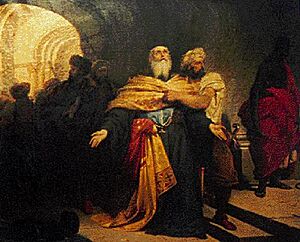Gregory V of Constantinople facts for kids
Quick facts for kids SaintGregory V of Constantinople |
|
|---|---|

Gregory shortly before his murder, as depicted by Nikiphoros Lytras
|
|
| Ecumenical Patriarch, Hieromartyr | |
| Born | Georgios Angelopoulos 1746 Dimitsana, Ottoman Empire |
| Died | 22 April 1821 (aged 74–75) Constantinople, Ottoman Empire |
| Venerated in | Eastern Orthodox Church |
| Major shrine | Metropolitan Cathedral of Athens |
| Feast | 10 April |
| Controversy | elected in 1797 but deported to Mount Athos, Ottoman Empire in 1798, reelected 1806 and exiled to Prince Islands then Mount Athos in 1810, reelected 1818 |
| Gregory V of Constantinople | |
|---|---|
| Ecumenical Patriarch of Constantinople | |
| Church | Church of Constantinople |
| In Office |
|
| Predecessor |
|
| Successor |
|
Gregory V (Greek: Γρηγόριος; 1746 – 22 April 1821) was an important leader of the Eastern Orthodox Church. He was born Georgios Angelopoulos (Γεώργιος Αγγελόπουλος). He served as the Ecumenical Patriarch of Constantinople three times: from 1797 to 1798, from 1806 to 1808, and from 1818 to 1821. During his time, he helped repair the Patriarchal Cathedral of St George. This church had been badly damaged by a fire in 1738.
Contents
Early Life and Church Career
Becoming a Church Leader
Gregory V was born in a place called Dimitsana. He started his studies in Athens in 1756 and continued there for two years. After that, he moved to Smyrna and studied for five more years.
He became a monk and took the name "Gregory" at a monastery in Strofades. He then studied at the Patmiada School. Later, he returned to Smyrna. There, he was ordained as a deacon by Procopius. Procopius was the main bishop of Smyrna at that time.
In 1785, Gregory became the Metropolitan of Smyrna himself. This happened when Procopius was chosen to be the Ecumenical Patriarch of Constantinople. In 1797, Gregory was first elected as the Ecumenical Patriarch. This was after Gerasimus III stepped down from the role.
Role in the Greek War of Independence
A Time of Uprising
The Greek War of Independence began when Greeks fought for freedom from the Ottoman Empire. As the leader of the Orthodox Christian community, Gregory V was seen as responsible. The Ottoman Sultan, Mahmud II, blamed him for not stopping the Greek uprising.
Gregory had actually spoken out against the Greek rebels. He did this to try and protect the Greeks living in Constantinople. He wanted to prevent them from being punished by the Ottoman Turks.
A Tragic Easter Day
However, when the Greek rebels won some battles, the Ottoman Turks reacted strongly. On April 22, 1821, which was Easter Sunday, Gregory had just finished a special church service. He was still wearing his church clothes when Ottoman soldiers took him from the Patriarchal Cathedral. He was then executed.
His body was later buried in the Metropolitan Cathedral of Athens. The Greek Orthodox Church honors him as an Ethnomartyr. This means a martyr for his nation. To remember him, the Saint Peter Gate at the Patriarchate was closed in 1821. It has remained shut ever since.
Impact of Gregory's Death
A Shock Across Europe
The execution of Gregory V, especially on Easter, deeply shocked many people. Greeks and Orthodox Christians in Russia were very angry. It also led to protests in other parts of Europe. This event helped to strengthen the movement of Philhellenism. Philhellenism was a movement where people supported the Greek struggle for independence.
There are stories that during the Greek War of Independence, many fighters carved Gregory's name on their swords. They wanted to get revenge for his death.
Mention in the Greek National Anthem
Dionysios Solomos wrote a poem called "Hymn to Liberty". This poem later became the national anthem of Greece. Some parts of the poem mention the hanging of Patriarch Gregory.
Historical Tensions
Difficult Times for Communities
Gregory's death led to some difficult situations in southern Greece. Some Greek rebels attacked Jewish shops. They believed that Jewish people had worked with the Turks. This caused some Jewish communities in northern Greece to side with the Turks against Christians. This then led to more attacks against Jewish people in the south.
In Odessa, which was part of the Russian Empire at the time, local Greeks attacked Jewish people. This was because of a rumor that Jewish people had been involved in Gregory's execution.
Images for kids
 | Stephanie Wilson |
 | Charles Bolden |
 | Ronald McNair |
 | Frederick D. Gregory |




